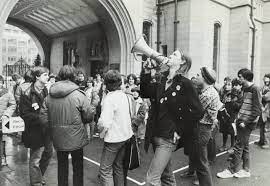The 1960s were a period of cultural radicalism. During the civil rights era, counterculture became prevalent. From the hippie movement to London’s Notting Hill Carnival, cultural expression emerged not simply as a means of voicing oneself but also as a form of protest. Civil rights and music culture in America were notably intertwined and expressed in a range of genres such as folk and gospel through the voices of those including Jamila Jones, Pete Seeger and Mahalia Jackson. Martin Luther King Jr. would acknowledge songs of freedom as “playing a strong and vital role in our struggle” and their importance in establishing “a radiant hope, in the future, particularly in [the] most trying hours.”
People, Power and Protest: Manchester’s Students against South African Apartheid, by Jason Lee
Recently students across Manchester united in an empowering march for Reclaim the Night’s forty-fifth anniversary. Attendees protested in solidarity for women, sex worker, trans and non-binary victims of violent misogyny. Speakers talked of their experiences furthering the campaign for safer streets and for GMCA to cut ties with organisations harming women and sex workers. This march is part of a long history of student collective action for social justice. The students of Manchester Anti-Apartheid protest exemplifies this tradition and perhaps we can learn something from this movement to inform the activism of today.
Diaz and de Rivera: Parallel Lives
Both Spain and Mexico are considered to be very colourful and vibrant countries, yet they also have dark pasts. The brutal dictatorships of Porfirio Díaz in Mexico and Miguel Primo de Rivera in Spain marred the uniquely spirited countries during the 19th and 20th Centuries. The regimes’ mirrored each other in many ways because the Continue Reading
Jazz: A History
Our modern perception of Jazz is considered to have taken form in the streets of New Orleans around the late 19th century, yet its origins can be traced back almost one hundred years earlier to West Africa. With the arrival of the slave trade, a new style of music emerged from Africa which allowed displaced Continue Reading
The Harlem Renaissance
On a quest for self-definition, African Americans in post-WWI America sought a new collective identity for themselves through political mobilisation, social commentary, and a mastery of the arts. The Harlem Renaissance was 1920s Harlem’s artistic and intellectual contribution to this quest, known at the time as the ‘New Negro Movement’. This movement was, in Continue Reading



